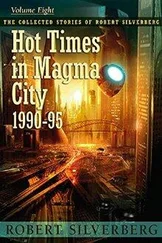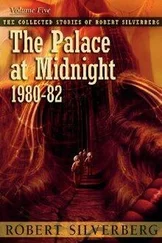Robert Silverberg - How it Was When the Past Went Away
Здесь есть возможность читать онлайн «Robert Silverberg - How it Was When the Past Went Away» весь текст электронной книги совершенно бесплатно (целиком полную версию без сокращений). В некоторых случаях можно слушать аудио, скачать через торрент в формате fb2 и присутствует краткое содержание. Год выпуска: 2007, ISBN: 2007, Издательство: Subterranean Press, Жанр: Фантастика и фэнтези, на английском языке. Описание произведения, (предисловие) а так же отзывы посетителей доступны на портале библиотеки ЛибКат.
- Название:How it Was When the Past Went Away
- Автор:
- Издательство:Subterranean Press
- Жанр:
- Год:2007
- ISBN:978-1-59606-089-0
- Рейтинг книги:4 / 5. Голосов: 1
-
Избранное:Добавить в избранное
- Отзывы:
-
Ваша оценка:
- 80
- 1
- 2
- 3
- 4
- 5
How it Was When the Past Went Away: краткое содержание, описание и аннотация
Предлагаем к чтению аннотацию, описание, краткое содержание или предисловие (зависит от того, что написал сам автор книги «How it Was When the Past Went Away»). Если вы не нашли необходимую информацию о книге — напишите в комментариях, мы постараемся отыскать её.
How it Was When the Past Went Away — читать онлайн бесплатно полную книгу (весь текст) целиком
Ниже представлен текст книги, разбитый по страницам. Система сохранения места последней прочитанной страницы, позволяет с удобством читать онлайн бесплатно книгу «How it Was When the Past Went Away», без необходимости каждый раз заново искать на чём Вы остановились. Поставьте закладку, и сможете в любой момент перейти на страницу, на которой закончили чтение.
Интервал:
Закладка:
It was all so easy. He knew so many good tricks. Let them scream out a twenty-digit number; he’d scream it right back. Let them bombard him with long strings of nonsense syllables; he’d repeat the gibberish flawlessly. Let them draw intricate mathematical formulas on the computer screen; he’d reproduce them down to the last exponent. His memory was perfect, both for visuals and auditories, and for the other registers as well.
The Shakespeare thing, which was one of the simplest routines he had, always awed the impressionable. It seemed so fantastic to most people that a man could memorize the complete works, page by page. He liked to use it as an opener.
He handed the book to Nadia, his assistant. Also his mistress; Montini liked to keep his circle of intimates close. She was twenty years old, taller than he was, with wide frost-gleamed eyes and a torrent of glowing, artificially radiant azure hair: up to the minute in every fashion. She wore a glass bodice, a nice container for the things contained. She was not very bright, but she did the things Montini expected her to do, and did them quite well. She would be replaced, he estimated, in about eighteen more months. He grew bored quickly with his women. His memory was too good.
“Let’s start,” he said.
She opened the book. “Page 537, left-hand column.”
Instantly the page floated before Montini’s eyes. “Henry VI, Part Two,” he said. “King Henry: Say, man, were these thy words? Horner: An’t shall please your majesty, I never said nor thought any such matter: God is my witness, I am falsely accused by the villain. Peter: By these ten bones, my lords, he did speak them to me in the garret one night, as we were scouring my Lord of York’s armour. York: Base dunghill villain, and—”
“Page 778, right-hand column,” Nadia said.
“Romeo and Juliet. Mercutio is speaking…‘an eye would spy out such a quarrel? Thy head is as fill of quarrels as an egg is full of meat, and yet thy head hath been beaten as addle as an egg for quarreling. Thou hast quarreled with a man for coughing in the street, because he hath wakened thy dog that hath lain asleep in the sun. Didst thou not—’”
“Page 307, starting fourteen lines down on the right side.”
Montini smiled. He liked the passage. A screen would show it to his audience at the performance.
“Twelfth Night,” he said. “The Duke speaks: ‘Too old, by heaven. Let still the woman take an elder than herself, so wears she to him, so sways she level in her husband’s heart: For, boy, however we do praise ourselves, our fancies are more giddy and unfirm—’”
“Page 495, left-hand column.”
“Wait a minute,” Montini said. He poured himself a tall glass of water and drank it in three quick gulps. “This work always makes me thirsty.”
Taylor Braskett, Lt. Comdr., Ret., US Space Service, strode with springy stride into his Oak Street home, just outside Golden Gate Park. At seventy-one, Commander Braskett still managed to move in a jaunty way, and he was ready to step back into uniform at once if his country needed him. He believed his country did need him, more than ever, now that socialism was running like wildfire through half the nations of Europe. Guard the home front, at least. Protect what’s left of traditional American liberty. What we ought to have, Commander Braskett believed, is a network of C-bombs in orbit, ready to rain hellish death on the enemies of democracy. No matter what the treaty says, we must be prepared to defend ourselves.
Commander Braskett’s theories were not widely accepted. People respected him for having been one of the first Americans to land on Mars, of course, but he knew that they quietly regarded him as a crank, a crackpot, an antiquated minuteman still fretting about the redcoats. He had enough of a sense of humor to realize that he did cut an absurd figure to these young people. But he was sincere in his determination to help keep America free—to protect the youngsters from the lash of totalitarianism, whether they laughed at him or not. All this glorious sunny day he had been walking through the park, trying to talk to the young ones, attempting to explain his position. He was courteous, attentive, eager to find someone who would ask him questions. The trouble was that no one listened. And the young ones—stripped to the waist in the sunshine, girls as well as boys, taking drugs out in the open, using the foulest obscenities in casual speech—at times, Commander Braskett almost came to think that the battle for America had already been lost. Yet he never gave up all hope.
He had been in the park for hours. Now, at home, he walked past the trophy room, into the kitchen, opened the refrigerator, drew out a bottle of water. Commander Braskett had three bottles of mountain spring water delivered to his home every two days; it was a habit he had begun fifty years ago, when they had first started talking about putting fluorides in the water. He was not unaware of the little smiles they gave him when he admitted that he drank only bottled spring water, but he didn’t mind; he had outlived many of the smilers already, and attributed his perfect health to his refusal to touch the polluted, contaminated water that most other people drank. First chlorine, then fluorides. Probably they were putting in some other things by now, Commander Braskett thought.
He drank deeply.
You have no way of telling what sort of dangerous chemicals they might be putting in the municipal water system these days, he told himself. Am I a crank? Then I’m a crank. But a sane man drinks only water he can trust.
Fetally curled, knees pressed almost to chin, trembling, sweating, Nate Haldersen closed his eyes and tried to ease himself of the pain of existence. Another day. A sweet, sunny day. Happy people playing in the park. Fathers and children. He bit his lip, hard, just short of laceration intensity. He was an expert at punishing himself.
Sensors mounted in his bed in the Psychotrauma Ward of Fletcher Memorial Hospital scanned him continuously, sending a constant flow of reports to Dr. Bryce and his team of shrinks. Nate Haldersen knew he was a man without secrets. His hormone count, enzyme ratios, respiration, circulation, even the taste of bile in his mouth—it all became instantaneously known to hospital personnel. When the sensors discovered him slipping below the depression line, ultrasonic snouts came nosing up from the recesses of the mattress, proximity nozzles that sought him out in the bed, found the proper veins, squirted him full of dynajuice to cheer him up. Modern science was wonderful. It could do everything for Haldersen except give him back his family.
The door slid open. Dr. Bryce came in. The head shrink looked his part: tall, solemn yet charming, gray at the temples, clearly a wielder of power and an initiate of mysteries. He sat down beside Haldersen’s bed. As usual, he made a big point of not looking at the row of computer outputs next to the bed that gave the latest details of Haldersen’s condition.
“Nate?” he said. “How goes?”
“It goes,” Haldersen muttered.
“Feel like talking a while?”
“Not specially. Get me a drink of water?”
“Sure,” the shrink said. He fetched it and said, “It’s a gorgeous day. How about a walk in the park?”
“I haven’t left this room in two and a half years, doctor. You know that.”
“Always a time to break loose. There’s nothing physically wrong with you, you know.”
‘I just don’t feel like seeing people,” Haldersen said. He handed back the empty glass. “More?”
“Want something stronger to drink?”
“Water’s fine.” Haldersen closed his eyes. Unwanted images danced behind the lids: the rocket liner blowing open over the pole, the passengers spilling out like autumn seeds erupting from a pod, Emily tumbling down, down, falling eighty thousand feet, her golden hair swept by the thin cold wind, her short skirt flapping at her hips, her long lovely legs clawing at the sky for a place to stand. And the children falling beside her, angels dropping from heaven, down, down, toward the white soothing fleece of the polar ice. They sleep in peace, Haldersen thought, and I missed the plane, and I alone remain. And Job spake, and said, Let the day perish wherein I was born, and the night in which it was said, There is a man child conceived.
Читать дальшеИнтервал:
Закладка:
Похожие книги на «How it Was When the Past Went Away»
Представляем Вашему вниманию похожие книги на «How it Was When the Past Went Away» списком для выбора. Мы отобрали схожую по названию и смыслу литературу в надежде предоставить читателям больше вариантов отыскать новые, интересные, ещё непрочитанные произведения.
Обсуждение, отзывы о книге «How it Was When the Past Went Away» и просто собственные мнения читателей. Оставьте ваши комментарии, напишите, что Вы думаете о произведении, его смысле или главных героях. Укажите что конкретно понравилось, а что нет, и почему Вы так считаете.












